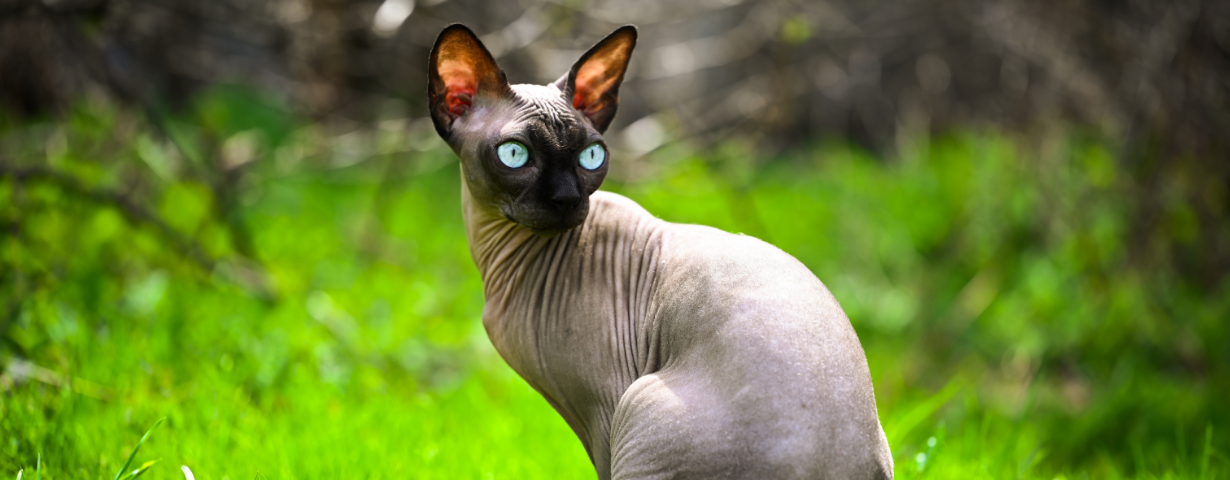Introduction to the Sphynx Cat
Have you heard of the sphynx cat? This feline is known for its unique appearance, after all, it has no fur! This hairless cat breed has gained more and more admirers around the world.
Despite its growing popularity as a pet, the origin of the sphynx cat is controversial. Some believe it originated in Mexico, while others argue that it originated in Canada. Regardless of where they come from, one thing is certain: the sphynx cat is a loyal and loving companion.
If you are considering having a sphynx puppy at home, know that they are very sociable animals and like to always be close to their owners. They easily adapt to any environment and are great for those with fur allergies.
So, if you’re looking for a unique kitten full of personality, the sphynx cat might be the perfect choice for you. Here is some essential information about this fascinating breed!
(130 words)
Origin and history of the Sphynx breed
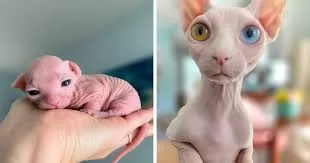
The Sphynx cat is a breed that appeared in Canada in the 1960s, being the result of a natural genetic mutation. This mutation caused the absence of hair on the animal’s body, giving rise to this peculiar breed of hairless cats.
The Sphynx is believed to have originated from a cross between a Devon Rex cat, known for its curly coat, and a common domestic cat. Through careful selection, breeders were able to develop the current Sphynx breed.
The era when the Sphynx was officially recognized as a distinct breed was in 1985. Since then, these cats have gained popularity all over the world due to their unique appearance and endearing features.
While many people might think that hairless cats are fragile or sensitive, this is not true. The Sphynx has warm, soft fur that feels like suede. They are hardy and adaptable animals, able to live comfortably in both cold and hot climates.
An interesting feature of Sphynx cats is their special need for skin care. Since they don’t have hair to absorb the skin’s natural oil, they need to be bathed regularly to prevent excessive oil buildup. In addition, they must be protected from the sun to avoid burns.
Despite its unique appearance, the Sphynx shares many characteristics with other cats. They are intelligent, affectionate and playful animals. They are known to be sociable and get along well with other pets and children.
Regarding health, Sphynx cats can be more prone to skin problems such as dermatitis and feline acne. However, with proper care and regular vet visits, these problems can be minimized or avoided.
In summary, the Sphynx cat is a fascinating breed that originated in Canada in the 1960s through a natural genetic mutation. With selective breeding over the years, the breed was developed until it was officially recognized in 1985. Despite the lack of fur, these cats are healthy, affectionate and adaptable to different climates. Special skin care is needed to maintain its overall well-being. If you are looking for a unique pet full of character, the Sphynx cat may be the perfect choice for you!
Physical Characteristics of the Sphynx Cat
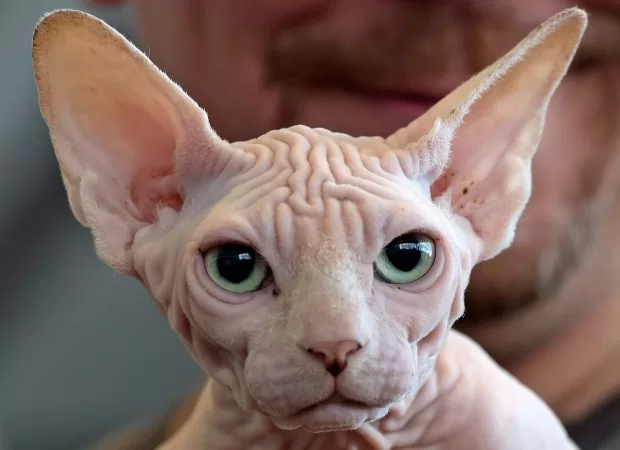
Hairless cats, also known as Sphynx cats, have unique physical characteristics that make them easily recognizable. Its warm and soft skin is one of the main characteristics of this breed.
The muscular and slender body of the Sphynx cat is another striking feature. They have a well-defined body structure, with apparent muscles that give cats an athletic look. This feature contributes to the agility and dexterity of these animals.
Big ears are another hallmark of Sphynx cats. They are proportional to the size of the head and stand out for their pointed shape. In addition, the expressive eyes of these felines draw attention due to the intensity of the look.
One of the advantages of having a Sphynx cat as a pet is the variety of colors and patterns available in this breed. Despite being known for not having fur, they can have different shades of skin, such as white, black, gray and brown. In addition, some specimens may have spots or stripes on their coat.
It is important to note that even though they are called “hairless cats”, Sphynx cats are not completely hairless. In fact, they have a thin, smooth layer that covers the entire body. This coat can vary in thickness and length between individuals of the breed.
Sphynx cats are known to be sociable and affectionate animals that love to be around their owners. They have an outgoing personality and often get along well with other pets, such as dogs and cats.
In addition, these cats are very intelligent and curious, which makes them great companions for games and interactive activities. They love exploring new environments and engaging in challenges that stimulate their mind.
In summary, the physical characteristics of the Sphynx cat include fur that is warm and smooth to the touch, a muscular and lean body, large ears and expressive eyes. Additionally, they feature a variety of colors and patterns in their coat. These sociable and intelligent felines make excellent companions for anyone looking for a unique and affectionate pet.
Sphynx cat behavior
The Sphynx cat is a unique and fascinating feline known for its hairless appearance. However, its behavior is also noteworthy. These animals are extremely sociable and affectionate with their owners, creating strong and lasting bonds.
Extremely sociable and affectionate with the owners
One of the most striking characteristics of the Sphynx cat is its unconditional love for its tutors. They are true companions, always looking for affection and attention. These cats love to be around people, whether it’s on the couch watching TV or in bed at night.
In addition, the Sphynx has a constant need for physical contact. They love to rub up against their owners’ legs and receive belly rubs. This constant closeness further strengthens the emotional bond between the animal and its owner.
Adapts well to other pets
Contrary to what you might think, the Sphynx cat is neither territorial nor possessive of other animals in the house. On the contrary, they usually get along very well with other pets, such as dogs and even other cats.
This feature makes the Sphynx an excellent choice for families who already have other pets. The integration takes place in a peaceful and harmonious way, providing a happy environment for all the pets in the house.
Likes to be in the spotlight
The Sphynx loves to be the center of attention. They are true artists and like to always be in the spotlight. If you’re looking for a cat that will steal the spotlight, the Sphynx is the perfect choice!
These felines have an outgoing personality and love to show off. They are always ready to receive visitors and make new friends. No wonder many Sphynx owners describe them as true “stars” in their homes.
Energetic, playful and curious
Despite its delicate appearance, the Sphynx cat is an extremely energetic animal. They love to play and explore their surroundings. If you’re looking for a companion to go along with your daily adventures, the Sphynx is sure to make a lively partner.
These cats are curious by nature and are always ready to discover new things. They love to investigate every corner of the house, climb on tall furniture and have fun with interactive toys.
Special care for the Sphynx cat
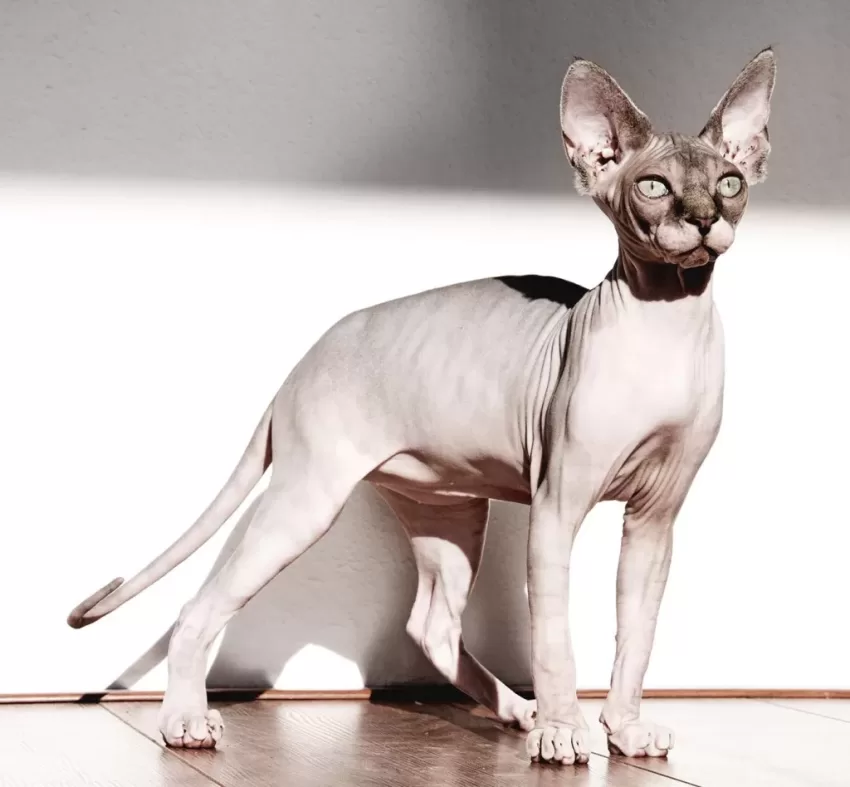
The Sphynx cat is a unique breed and requires special care due to its lack of hair. Despite not having a coat like most cats, this cat still needs attention and affection to stay healthy and happy. In this article, we’re going to cover some of the main care that should be taken with a Sphynx cat.
Regular baths to remove excessive body oil
One of the most striking characteristics of the Sphynx cat is the excessive production of oil by the skin. To prevent this oil from accumulating and causing dermatological problems, it is important to bathe your pet regularly. Use a mild shampoo recommended by your veterinarian to wash your cat’s body. Also remember to dry him completely after bathing, as moisture can cause colds.
Protection against extreme temperatures (cold or heat)
Due to the absence of fur, Sphynx cats are more sensitive to temperature variations. It is essential to protect them both from cold and excessive heat. During the colder months, provide your pet with suitable clothing to keep him warm. Already on hot days, avoid prolonged exposure to the sun and make sure he has access to shaded areas and fresh water.
Regular cleaning of the ears to prevent earwax buildup
Like other felines, Sphynx cats also need to have their ears cleaned regularly. Due to the lack of hair, wax can build up more easily and cause discomfort to the animal. Use a veterinary-recommended cleaning solution and a gauze or cotton pad to gently remove the wax from your cat’s ears. Avoid using cotton swabs, as they can push wax into your ear.
Sun protection during sun exposure
Despite not having hair, the Sphynx cat’s skin can still be sensitive to sunlight. During periods of exposure to the sun, whether indoors or outdoors, it is important to protect your pet with animal-specific sunscreen. Consult a veterinarian for recommendations on the most suitable products and follow application instructions.
Taking care of a Sphynx cat requires special attention compared to common care for other felines. In addition to the points mentioned above, also remember to provide a balanced diet and regularly consult a veterinarian to ensure that your pet is healthy and happy.
Wet food options for cats
Proper nutrition is essential to maintain the health and well-being of our feline friends. When it comes to cats, a very popular option is wet food, especially for sphynx cat owners. This particular breed requires special care due to its lack of hair, and wet dog food can be an excellent choice to meet its specific nutritional needs.
Nutritional benefits superior to dry food
One of the main advantages of wet food compared to dry food is its superior nutritional value. Most brands offer a variety of flavors that contain high-quality ingredients such as fresh meat or fish, vegetables and even fruit. This combination provides sphynx cats with the essential nutrients needed for a balanced diet.
In addition, the soft texture of wet food facilitates the digestion of felines, especially those with gastrointestinal sensitivity. This means they can get all the nutritional benefits without putting a strain on their digestive system.
Higher water content, aiding in the hydration of felines
Another significant advantage of wet food is its high water content. Cats are known for not drinking a lot of water naturally, which can lead to dehydration and kidney problems. By offering wet food on a regular basis, you are providing an additional source of hydration for your sphynx cat.
The water in wet food helps keep cats hydrated, which is especially important in hot weather or during the summer. Additionally, older cats or those with kidney problems may benefit even more from this increased water intake.
Variety of flavors available in the market
One of the things that makes wet food so attractive to sphynx cat owners is the wide variety of flavors available on the market. Different brands offer options such as chicken, fish, red meat and even exotic combinations.
This variety allows you to experiment with different flavors and find the one your cat likes the most. In addition, by offering a variety of flavors, you will prevent your feline from getting bored with their daily food.
Suitable for cats with dental problems
Sphynx cats can also experience specific dental issues. Due to the lack of hair, they are more prone to tartar formation and other oral problems.
Life Expectancy of the Sphynx Cat
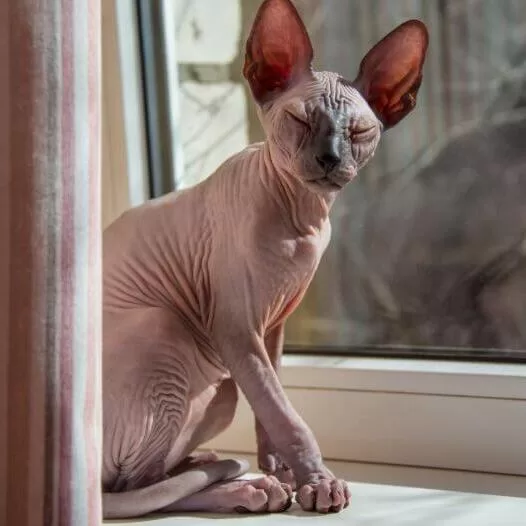
The Sphynx Cat is a breed known for its unique appearance and hairless fur. But have you ever wondered what the life expectancy of this very special feline is? In this article, we’ll explore the average lifespan of the Sphynx Cat, the care it needs to prolong its lifespan, and the genetic diseases it may be susceptible to.
Average lifespan between 12 and 16 years
The average lifespan of the Sphynx Cat varies between 12 and 16 years. However, it is important to point out that each cat is unique and there may be individual variations. Some cats may live longer, while others may have a shorter lifespan. Life expectancy is subject to factors such as genetics, proper care and lifestyle.
Proper care can extend your life expectancy
To ensure that your Sphynx Cat lives as long as possible, providing it with proper care is essential. This includes a balanced and nutritious diet, regular exercise to maintain a healthy weight, and a safe home environment. In addition, grooming also plays an important role in your hairless kitty’s health. Regular baths are necessary to remove oil buildup on the skin.
Susceptible to some breed-specific genetic diseases
Like other feline breeds, the Sphynx Cat can be susceptible to some specific genetic diseases. It is important to be aware of these conditions to ensure that your cat receives the necessary care. Some of the most common ailments include:
- Hypertrophic cardiomyopathy: a condition in which the heart muscle becomes thickened, making it difficult for it to pump blood properly.
- Hip dysplasia: a malformation in the hip joint that can cause pain and difficulty walking.
- Kidney Diseases: Kidney problems can occur in some strains of Sphynx cats.
Regular visits to the vet are essential
To ensure the health and well-being of your Sphynx Cat, regular visits to the veterinarian are essential. The veterinarian will be able to monitor your cat’s health, identify possible problems early and recommend appropriate treatments. In addition, vaccines and deworming must also be kept up to date to prevent illness.
In summary, the life expectancy of the Sphynx Cat varies between 12 and 16 years, but can be influenced by several factors.
Recommended food for adult cats
When it comes to feeding our feline friends, choosing the right food to meet their nutritional needs is essential. In the case of adult cats, such as the Sphynx cat, it is even more important to ensure that they receive a balanced and specific diet for their life stage. Here are some tips on recommended food for adult cats:
Balanced and specific feed for adult cats
One of the first things to consider when choosing a food for your adult cat is to choose a balanced and specific formula for this stage of life. These foods are formulated with the nutritional needs of adult cats in mind, providing the essential nutrients they need to stay healthy and active. Consulting a veterinarian can be helpful in this decision, as they will be able to recommend trusted and proven brands.
Check if it meets the nutritional needs of the Sphynx
The Sphynx is a breed of cat known for its hairless fur, which means they have slightly different nutritional requirements than other breeds. When choosing the ideal food for your adult Sphynx, make sure it contains ingredients that promote healthy skin and prevent dermatological problems common in this breed. Look for pet foods that contain omega-3 and omega-6 fatty acids, which help keep the skin hydrated and healthy.
Grain-free or high-quality protein options
Another important point to consider when choosing a food for your adult Sphynx cat is the presence of grains in the composition. Some cats may be sensitive or allergic to grains, so opting for grain-free foods may be a good option. Also, make sure the food contains high-quality protein such as chicken, beef or fish. These proteins are essential for maintaining your cat’s muscle health.
Appropriate amount according to weight and physical activity
It is essential to feed your adult Sphynx cat the right amount of dry food to avoid problems with excessive weight or malnutrition. The ideal amount varies according to the cat’s weight and daily physical activity. More active cats generally need more calories to support their activity, while less active cats may need less. Consult a veterinarian to determine the correct amount for your adult Sphynx cat.
Specific needs of the Sphynx breed
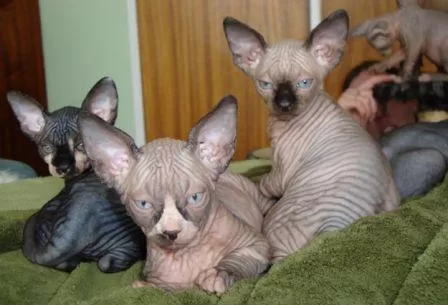
Sphynx cats are known for their unique appearance without protective hair. This special feature makes them have some specific needs to ensure their proper well-being and health. Here are some important points to consider when caring for a Sphynx cat:
Special skin care
Due to the lack of hair, Sphynx cats have sensitive skin that requires extra attention. It is essential to keep the skin clean and hydrated to avoid problems such as dryness, irritation and skin infections. It is recommended to bathe the cat regularly with gentle products specific to its sensitive skin. In addition, it is important to protect yourself from excessive exposure to the sun, as your skin may be more prone to sunburn.
cold sensitivity
Because they don’t have hair to keep warm naturally, Sphynx cats are more sensitive to cold than other breeds. In colder climates or during the winter, it is recommended to provide clothes or blankets to keep them warm and comfortable. Be sure to provide a warm environment in the home by preventing drafts and providing warm places to rest.
Regular oral hygiene
Like all feline breeds, Sphynx cats also need proper dental care. The absence of hair in the mouth can facilitate the accumulation of plaque and tartar, leading to dental problems such as gingivitis and cavities. Therefore, it is essential to brush your cat’s teeth regularly with an animal-specific toothbrush and toothpaste. It is also recommended to carry out periodic professional cleanings with a specialized veterinarian.
enriched environment
Sphynx cats are curious and active animals, so providing an enriched environment at home is essential. Provide interactive toys that stimulate their hunting instinct and offer distraction. In addition, scratching posts are essential so that they can naturally sharpen their nails and avoid damaging furniture or other objects in the house. Also make sure to provide comfortable places for rest and quiet time.
Caring for a Sphynx cat can be a rewarding experience, but it requires careful attention to its specific needs. From skin care to the right environment for physical and mental exercise, every aspect contributes to your overall health and well-being.
Care Tips for the Sphynx Cat
Sphynx cats are known for their unique appearance and hairless fur. These exquisite felines have specific care needs to ensure they are healthy and happy. Here are some important tips to help you care for your Sphynx cat.
Brush teeth regularly to prevent tartar and periodontal disease
Just like humans, cats can also suffer from dental problems such as tartar and periodontal disease. To avoid these complications, it is essential to brush your Sphynx cat’s teeth regularly.
Start by gradually getting your cat used to toothbrushing. Use a soft toothbrush or fingernail designed for pets and a toothpaste formulated specifically for cats. Make sure not to use human toothpaste as it can be harmful to your pet.
Gently brush your cat’s teeth in a circular motion, focusing especially on the gum line. Do this at least twice a week to keep your feline’s oral health up to date.
Keep nails trimmed to prevent accidental scratches
Sphynx cats do not have protective hair on their paws, which means their claws are exposed at all times. It’s important to keep your Sphynx’s nails trimmed properly to prevent accidental scratches on you or other family members.
Use a cat-specific nail clipper and cut only the tip of the nails, being careful not to hit the sensitive blood vessels known as the quicks. If you don’t feel comfortable doing this task yourself, you can seek help from a veterinarian or pet shop professional.
In addition, providing suitable scratching posts is also essential so that your Sphynx cat can naturally sharpen its nails and avoid damaging furniture or objects in the house. Opt for vertical and horizontal scratching posts, with different textures, to offer variety to your feline.
Provide a warm environment during the winter
Due to the lack of fur, Sphynx cats are more sensitive to temperature variations. During the winter, it is essential to ensure that your cat has a warm and comfortable environment in which to shelter.
Make sure the temperature inside your home is maintained at levels suitable for your Sphynx’s comfort.
Conclusion: Everything you need to know about the Sphynx Cat
After exploring the main aspects of the Sphynx cat, we can conclude that this unique breed has an interesting origin and a fascinating history. Its distinctive physical characteristics, such as its lack of hair and wrinkled skin, make the Sphynx easily recognizable. In addition, its affectionate and sociable behavior makes it a great companion for the whole family.
However, it is important to highlight that the care of the Sphynx cat is special. Due to the lack of hair, they can be more sensitive to cold and sun, needing adequate protection. Also, your skin requires extra attention to avoid dryness and irritation.
As for food, it is recommended to offer wet food options to ensure the necessary hydration for the Sphynx. There are several brands on the market that offer specific products to meet the nutritional needs of this breed.
Regarding the life expectancy of the Sphynx cat, it is estimated that they live an average of 12 to 16 years. However, it is important to remember that each individual is unique and may vary in this regard.
To ensure the well-being of your Sphynx cat, it is recommended to look for recommended food for adult cats and consider their specific needs while choosing the right foods.
In terms of daily care, some important tips include regular showers to keep the skin clean, nails trimmed and protection from temperature extremes. In addition, it is essential to offer your Sphynx lots of love and affection, as they are extremely affectionate animals.
In summary, the Sphynx cat is a unique breed that requires special care due to its lack of hair and sensitive skin. However, with proper care and lots of love, you will have a loyal and caring companion by your side for years to come.
Now that you know more about the Sphynx cat, it’s time to consider whether this breed is the right choice for you. Remember to research more information about responsible breeders and ensure you are prepared to provide all necessary care before making a decision. After all, a new family member requires commitment and dedication.
Common questions
Is the Sphynx cat a hypoallergenic breed?
No cats are completely hypoallergenic, but many people who are allergic to fur can better tolerate living with a Sphynx cat due to their lack of fur.
Does the Sphynx cat need to use sunscreen?
Yes, the Sphynx cat must be protected from the sun using specific sunscreen for pets or clothing that covers exposed skin.
What is the ideal temperature for an environment where a Sphynx cat lives?
The environment where a Sphynx cat lives must be between 20°C and 25°C, providing a pleasant temperature and preventing it from feeling cold.
Are Sphynx cats sociable with other animals?
Yes, Sphynx cats are generally sociable and get along well with other pets as long as introductions are made gradually.
External References:

